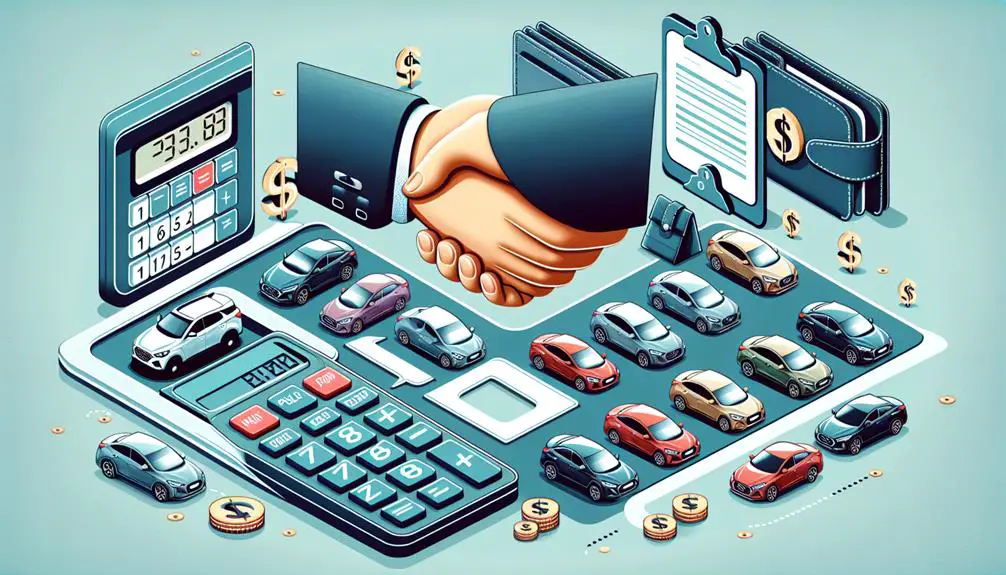Hyundai dealer fees can vary depending on the location and dealership. It is essential to understand these fees to avoid surprises when purchasing a car. Some common dealer fees include documentation fees, destination charges, and advertising fees. By knowing what these fees are and negotiating with the dealer, you may be able to save money on your car purchase.
Understanding the breakdown of Hyundai dealer fees can empower you as a consumer and help you make informed decisions. It's important to ask for a detailed explanation of any additional charges to ensure you are not being overcharged. By being aware of the fees associated with buying a Hyundai, you can budget more effectively and potentially save money on your purchase.
Understanding Dealer Fees

When you're purchasing a vehicle from a Hyundai dealership, it's crucial to grasp the array of dealer fees that may apply, as they greatly impact the total cost. Dealer transparency is key in this process. A reputable dealer should be upfront about all the fees, allowing you to make an informed decision. It's not just about the sticker price; the additional fees can add up, altering the financial landscape of your purchase.
To navigate this, ask for a detailed fee breakdown. This document should list all the charges, including those that are part of the dealership's business practice and any that are mandated by law. Understanding these fees helps you analyze the true cost of your Hyundai and serves as a negotiating tool. By being informed, you're in a stronger position to discuss these fees, question any that seem unreasonable, and potentially have them reduced or removed.
Common Hyundai Dealer Fees
Comprehending the array of dealer fees is the initial step; now let's examine the common Hyundai dealer fees you're likely to encounter during your purchase. Understanding these fees not only prepares you for the financial aspect of your car buying adventure but also arms you with the knowledge for better negotiations, albeit that's a topic for later. Fee transparency is critical in this process, as it guarantees you're not blindsided by unexpected costs. Additionally, be aware of local variations, as dealer fees can greatly differ based on your location.
Here are some common Hyundai dealer fees:
- Documentation Fee (Doc Fee): Covers the cost of processing your paperwork. This fee varies widely.
- Destination Charge: A fixed fee for transporting the vehicle from the factory to the dealership.
- Title and Registration Fees: Mandatory fees for titling and registering your vehicle in your state.
- Sales Tax: Calculated as a percentage of the purchase price.
- Dealer Preparation Fee: Charged for preparing the car for sale, including cleaning and inspections.
Negotiating Dealer Fees

Exploring the landscape of Hyundai dealer fees, you'll find that effectively negotiating these costs can lead to important savings on your vehicle purchase. It's important to enter the dealership armed with knowledge and a clear strategy. Begin by grasping the standard fees and identifying which can be reduced or waived.
When discussing trade-in tactics, keep in mind that the value of your current vehicle can greatly impact the entire deal. Research its market value beforehand and negotiate its trade-in price separately from the purchase of the new car. This separation guarantees clarity in negotiations and prevents dealers from inflating new vehicle prices to offset a higher trade-in value.
Finance options also play an important role in negotiating dealer fees. Dealers often have a markup on financing rates, which can be negotiated down. Alternatively, securing a pre-approved loan from an external lender gives you influence, as it sets a benchmark rate the dealer must beat to earn your business.
In your discussions, be polite yet firm, and always be prepared to walk away if the deal doesn't meet your expectations. Keep in mind, your most powerful negotiating tool is your ability to choose where you spend your money.
Additional Costs to Consider
Beyond negotiating dealer fees, it's also important to contemplate other costs that can impact the total price of your Hyundai purchase. Understanding these additional expenses will help you budget more effectively and make a more informed decision.
When considering the full cost of owning a Hyundai, it's vital to look beyond the sticker price. Here are some key factors to keep in mind:
- Fuel Efficiency: While Hyundai vehicles are known for their fuel efficiency, variations among models can affect your long-term fuel costs. Choose a model that balances performance with fuel economy to save money over time.
- Warranty Extensions: Hyundai offers one of the best warranties in the industry. However, you might consider purchasing extended warranty options for added peace of mind, which will increase your upfront costs but potentially save you money on future repairs.
- Insurance Premiums: The model and trim of your Hyundai can have a significant impact on your insurance rates. Research and compare insurance costs for different Hyundai models before making your decision.
- Maintenance and Repairs: Factor in the cost of regular maintenance and potential repairs. Hyundai's reliability is commendable, but routine upkeep is essential for long-term vehicle health.
- Registration and Taxes: Don't forget to account for the cost of registering your vehicle and any applicable sales taxes, which can vary significantly by location.
Navigating Your Purchase

Once you've considered all additional costs, it's key to navigate your Hyundai purchase with a strategic approach to secure the best deal possible. Carefully weighing your financing options and grasping the true value of any trade-ins are key steps in this process.
| Strategy | Details |
|---|---|
| Research Financing | Compare rates from the dealer and external lenders. |
| Grasp Trade-In | Know your car's market value to negotiate better. |
| Timing Your Purchase | Look for end-of-month or year sales for better deals. |
| Ask for Special Offers | Inquire about any ongoing promotions or rebates. |
| Read the Fine Print | Be aware of all terms and conditions in your contract. |
Exploring different financing options can save you a significant amount of money in the long run. Dealerships often offer financing, but their rates might not always be the best available. It's wise to compare these with what banks or credit unions can offer you.
Knowing your current vehicle's trade-in value is equally crucial. Dealers will often offer less than what your car is worth on the open market. Armed with knowledge, you can negotiate more effectively, ensuring you get the best value for your trade-in and the most favorable terms for your new Hyundai purchase.
Conclusion
In sum, maneuvering Hyundai dealer fees requires a keen eye and sharp negotiation skills. You've learned the typical fees to expect and the importance of dissecting them.
Remember, negotiating isn't just about slashing costs; it's about comprehending what you're paying for. Don't overlook the additional costs that can sneak up on you.
Armed with this knowledge, you're better equipped to steer through your purchase, ensuring you get the best deal possible without unnecessary expenses weighing you down.